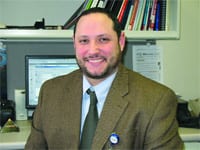The Importance of Planning for the End
Physicians undergo years of education and training to promote wellness, cure and heal, and protect life. Yet, we also know that death is inevitable, and we are increasingly recognizing the importance of advance care planning. We urge patients to do the same.
Advance care planning is the term for the planning we do as our healthcare becomes complicated and we need to make challenging decisions about our care, often toward the end of life. Planning becomes an integral part of most people’s lives at an early age, and most of us are always planning ahead. We plan for education and careers; we create wills, buy life insurance, and establish retirement accounts.
Advance care planning can be thought of in the same way, as a medical part of the future, because one day, despite how intense our will to live may be, the end will arrive. Planning makes your wishes known ahead of time and ensures that they are fulfilled.
The planning begins with the simple act of talking with your healthcare provider and family members to let them know what your wishes are about end-of-life issues. Once those decisions are reached — and it can be appropriate over time to revisit the discussion to change or refine previous decisions — patients then complete certain forms to specify their wishes.
Two of the most important forms are the healthcare proxy and a MOLST form. A healthcare proxy indicates which person you choose to make healthcare decisions on your behalf should you become unable to do so. The MOLST form — an acronym for medical orders for life-sustaining treatment — outlines your preferences for such areas as whether or not you wish to be resuscitated in certain situations. Copies of completed forms should be distributed to family members and all your healthcare providers.
Advance care planning isn’t recommended just for elderly patients or those with terminal illnesses. Physicians recommend that the conversation and planning for everyone start earlier rather than later because of the uncertainty of when that final moment might arrive.
End-of-life care may also include palliative care and hospice care, and patients are urged to learn about these areas of medical care as well. Palliative care refers to the type of care that is delivered when someone is diagnosed with a life-limiting illness. Hospice care is care for those entering the last few months of life, usually with a prognosis of six months or fewer to live.
Getting the conversation started is the first step, and getting it started early is important. Not only will that make your wishes known, but it has benefits for family members as well. Letting your family know what you want in these serious circumstances can prevent your loved ones from carrying the burden of deciding your course of care. It may also avoid family turmoil, as each family member knows exactly what your wishes are and how they are to be carried out.
Healthcare can get more complicated as we age. We may accumulate more illnesses, get frailer, and become more susceptible to injury. Advance care planning makes us think about what we want, what’s most important, and then communicate that with family members and the healthcare team.
Physicians certainly recognize the persistent hope patients can have, even in the most dire of circumstances. But in addition to being a healthcare advocate throughout life, physicians are now able to play an important role in end-of-life care as well.
Many patients who face terminal illness tell us that they are praying for a miracle. We believe in miracles, too: the miracles of dignity, comfort, love, and peace. If patients work together with their healthcare team, physicians can help to make those miracles happen.
If you or a family member wants to talk, and your healthcare provider doesn’t open the conversation, take the first step and ask. The topic is too important to ignore.
More information, including a free brochure, Planning Ahead: What Are Your Choices? which lists a number of resources, is available free from the Mass. Medical Society at www.massmed.org/
Dr. Eric Reines is a geriatrician with Element Care in Lynn, and Dr. Beth Warner is a geriatrician with Cooley Dickinson Health Care in Northampton. Reines is chair, and Warner is a member, of the Mass. Medical Society’s Committee on Geriatric Medicine. This article is a public service of the Mass. Medical Society.


Comments are closed.